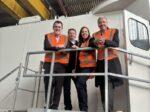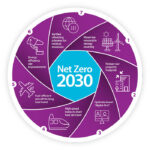ABB study shows New Zealand industries step up to lead Asia Pacific’s energy transition
Independent study commissioned by ABB reveals that 77% of New Zealand business leaders in key industries are allocating over 10% of their capital expenditure to energy transition initiatives over the next five years. Technological advancement identified as a top driver of the energy transition, with 67% citing it as having the greatest potential to accelerate progress. New Zealand’s high share of renewable electricity – around 85%, mainly from hydropower, geothermal and wind energy – gives it a strong foundation to lead the Asia-Pacific region in decarbonisation. The ABB Asia Pacific Energy Transition Readiness Index 2025 in collaboration with Sandpiper Research and Insights has surveyed close to 4,100 business, IT, and sustainability leaders responsible for technology, electrification and automation strategies across 12 markets in Asia Pacific – Australia, Mainland China, Indonesia, Japan, Malaysia, New Zealand, Philippines, Singapore, South Korea, Taiwan, Thailand, and Vietnam. The respondents are drawn from key industries including property & infrastructure, chemicals & refining, data centres, energy & power generation, industry & manufacturing, steelmaking, machinery & mining, pharmaceutical & life sciences, oil & gas, transportation, and water & waste solutions. A key finding was that Kiwi companies are investing heavily in clean energy, automation and digitalisation. Anders Maltesen, President of ABB Energy Industries Asia, says, “New Zealand’s high share of renewable electricity – around 85%, mainly from hydropower, geothermal and wind energy – gives it a strong foundation to lead the Asia-Pacific region in electrification and decarbonisation. But to meet net-zero by 2050, electricity use must increase by over 60%, and that means there’s urgency to scaling smart technologies and modernising ageing infrastructure.” Business is increasing green investment, and geopolitics is an opportunity to lead More than 200 respondents were surveyed from New Zealand and the findings show that 77% (73% regionally) are allocating over 10% of […]








